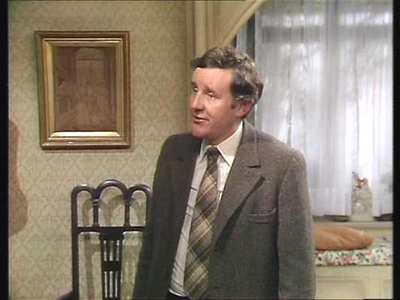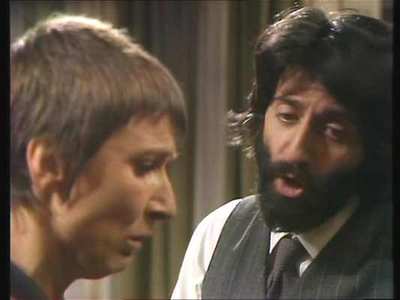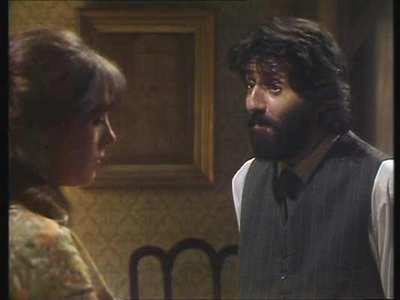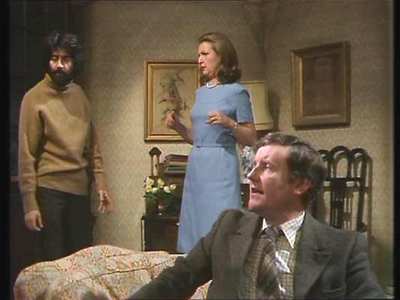Review of Norman Conquests, The (Box Set) (Three Discs)
Introduction
The idea of `Plays - on television?` is likely to be met by most with as much bewilderment as Peter Kay`s father`s reaction to `Garlic? BREAD?` Surely the whole point of TV (if there was ever such a thing) is that you are unbound by the constraints of the stage. Sure, adaptations are one thing, but to contain 100 minutes of televisual comedy drama all in one room seems dull in the extreme. Doing exactly the same thing twice more appears to be nothing shy of lunacy …
That`s before you`ve considered that `The Norman Conquests` aren`t, strictly speaking, three different plays - they are three parts of the same story, told from the perspective of the dining room, the living room and the garden.
Starring Richard Briers, his `Good life` sparring partner Penelope Keith, `Ever Decreasing Circles` marital partner Penelope Wilson, Tom Conti (you`ll recognise him from `Shirley Valentine`), Fiona Walker and David Troughton (son of Dr Who actor Patrick Troughton), `The Norman Conquests` are a witty and skilful look at the English suburban middle classes. That they were written by Alan Ayckbourn will come as no surprise to anyone who has ever seen ANY of his other plays; this is the demographic which he writes about most ably.
Annie (Wilton) plans to spend a dirty weekend with her sister Ruth`s husband Norman (Conti), and so invites Brother Reg (Briers) and his missus Sarah (Keith) to come and look after `mother` and the house. The next door neighbour Tom (Troughton) has designs on Annie himself, but is too shy and useless (read: genuinely nice) to do anything about it.
However, once Sarah persuades Annie not to go away with Norman (in the bossy manner that all of Penelope Keith`s characters use), the six of them spend a summer`s weekend together after Ruth responds to Norman`s drunken phone calls, and comes to join them. Norman assumes he holds enough aces up his sleeves to bag all three women, but his suit is tested to its full strength as time passes, and we finally see the full picture.

Video
Not very good, but what did you expect? Understandably, the wobbly sets look very of the time and are therefore very brown and colourless, but this is an almost straight from TV transfer, and so there isn`t much more you could hope for. It was the seventies you know - more than just Wogan favoured beige back then!
Of all three plays, the visuals on `Round and round the garden` are the best, for being a bit adventurous. Whereas the other two plays are confined to only one room, the aforementioned outside play (the final instalment of the trilogy) is allowed free reign of the sizeable back garden.
One slightly irritating fact about each of the three discs is that the feature has the twirly black and white thing that lets you know that the advert break is imminent still in the corner. Couldn`t they have removed that?

Audio
Far from impressive. The theme tune perfectly encapsulates the sleepiness and seemingly dreary middle class and middle aged existence that the characters lead. The Dolby 2.0 sound is well suited, but don`t go anticipating any more than your standard television-transfer.

Features
There are NO extras. Maybe a cast and crew biog or something would`ve been nice? Actually, forget that, nobody reads those anyway.

Conclusion
The three plays included - `Table Manners`, `Living together` and `Round and round the garden` don`t so much conquer, as politely invite themselves in and offer to help you with the washing up. So achingly English are both Ayckbourn`s writing style and the choice of actors, that it is embarrassing at times. If an American or French person saw these DVDs, the discs would almost definitely confirm any preconceived stereotypes that they had of our nation - the polite idiots that never get anywhere fast and live a boring existence centred round neatly trimmed privet hedges and kitchen stoves. The closest it comes to rape and pillage is a quick (consensual) roll around on the grass in the midday sun.
None of this means that `The Norman Conquests` isn`t enjoyable; most of the time, quite the contrary is true. Briers, Keith and Wilton proved their worth as actors in the sitcom heyday of the 1980s (with Wilton enjoying a revival at the moment with roles in, amongst others, Dr Who and Woody Allen`s last movie `Match Point`), and suffice to say the rest of the performances are well above par. The only fault with this is that they are almost TOO good, TOO staged, TOO perfect. The long dramatic pauses work well on stage, but on the small screen they seem a little contrived.
As a story, however, the three plays work extremely well together - `Table Manners` is the opener, `Round and round.` the last, and so it is logical to watch them in that order, but really there is no right or wrong sequence to watch the discs in, each providing a piece of the puzzle that the others do not. This approach to writing is one with benefits and drawbacks. The layering of the story makes it a very interesting experience, and gives you a sense of smug satisfaction to know what is going on in the room next to that shown on screen. On the down side, there is a feeling of déjà vu, as each play lasts in excess on 90 minutes and - at points- tests your patience.
Norman`s eventual undoing is, not surprisingly, splendid to witness, and Ayckbourn`s slow revelation of what has occurred is well timed and cleverly executed. Sometimes you yearn for something a bit more challenging - a bit more NOW, yet for whiling the hours away in your English country living room, this will do just fine.
Your Opinions and Comments
Be the first to post a comment!